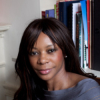Dambisa Moyo

Dambisa Moyo
Dambisa Moyo2 February 1969) is a Zambian-born international economist and author who analyzes the macroeconomy and global affairs. With post-graduate degrees in business, public administration, and economics from American University, Harvard, and Oxford, Moyo currently serves on the boards of Barclays Bank, the financial services group, SABMiller, the global brewer, and Barrick Gold, the global miner. She worked for two years at the World Bank and eight years at Goldman Sachs before becoming an author and international public speaker. She...
NationalityZambian
ProfessionEconomist
Date of Birth2 February 1969
CountryZambia
We've reached a very low-level equilibrium where it's not clear whose interest it is in to develop Africa... It's not in the interest of those in the aid industry to develop Africa because then there'd be no more industry and 500,000 people would lose their jobs. The only people whose interest it is in is Africans, but they have no voice.
China is attempting the death-defying feat, which no one has attempted in the history of the world, which is to move a billion people out of poverty. When I speak to Chinese policy-makers, the thing that annoys them the most about Western policy-makers is that they're not given any credit for anything.
The people I admire unreservedly are my parents. They are the real pioneers of Africa in many ways. They were born and raised in rural Africa during the colonial period. They are the ones who came to the U.S. long before I did.
This is a great continent. I went to primary school on this continent, secondary school, university. I've worked on this continent, and I think that it's a great disservice that, for whatever reason, people have usurped an imagery of Africa that is absolutely incorrect.
A nascent economy needs a transparent and accountable government and an efficient civil service to help meet social needs. Its people need jobs and a belief in their country's future. A surfeit of aid has been shown to be unable to help achieve these goals.
I'm not a politician - it's not my cup of tea.
A constant stream of 'free' money is a perfect way to keep an inefficient or simply bad government in power. As aid flows in, there is nothing more for the government to do - it doesn't need to raise taxes, and as long as it pays the army, it doesn't have to take account of its disgruntled citizens.
I had the good fortune to spend hours with my parents around the dinner table having debates on politics and economics.
The insidious aid culture has left African countries more debt-laden, more inflation-prone, more vulnerable to the vagaries of the currency markets and more unattractive to higher-quality investment.
Too many African countries have already hit rock-bottom - ungoverned, poverty-stricken, and lagging further and further behind the rest of the world each day; there is nowhere further to go down.
There's not a single country that actually approaches economics in a pure, free market, capitalist way. I like the free market - but it very much exists only in textbooks. If I had a choice, and we could live in a very pure world, I would be a supporter of the free markets.
The World Bank can only survive if it's spending money.
The western mindset erroneously equates a political system of multi-party democracy with high-quality institutions... the two are not synonymous.
The most obvious criticism of aid is its links to rampant corruption. Aid flows destined to help the average African end up supporting bloated bureaucracies in the form of the poor-country governments and donor-funded non-governmental organizations.